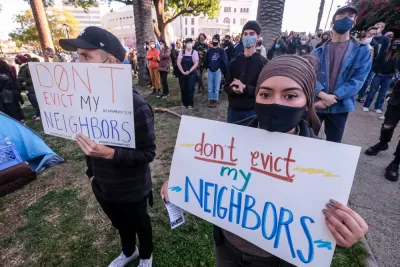L.A.’s pandemic-era renter protections are credited with stabilizing homelessness in the region, but they ended at the end of March. Meanwhile, evictions are on the upswing around the country, led by L.A.’s neighbor to the east, Las Vegas.

Pandemic-era renter protections ended recently in Los Angeles County, just over three years after they were created to protect vulnerable residents during the uncertainty and upheaval of the early days of Covid-19.
“Elected leaders, such as L.A. Mayor Karen Bass, and local homeless service providers say they’re bracing for a wave of evictions across the region after the COVID-19 renter safeguards expire,” according to an article by David Wagner for LAist. In fact, according to recent U.S. Census Bureau survey data, “An estimated 246,000 renter households in the L.A. area were already behind on rent ahead of the [recent] deadline.”
The fear is that the loss of renter protections, including eviction protections, could increase the number of people experiencing homelessness in a county where 69,000 people are unhoused. As noted by Wagner, homelessness figures in the region actually stabilized during the pandemic, potentially thanks to the robust social safety net put in place during the pandemic.
“Until now, economic harms from the pandemic served as a defense from eviction for low-income renters in L.A. County who couldn’t pay rent on time. Starting Saturday, renters living anywhere in the county will no longer be able to cite COVID-19 as a reason to delay rent payments,” writes Wagner.
The proof that the eviction protections worked in L.A. County is in the data. According to data from the Los Angeles Sherrif Department, obtained by LAist, evictions fell by 85 percent in the last nine months of 2020 compared to the same period in 2019.
Las Vegas Leads the Nation in Evictions
Los Angeles County rescinded its Covid-19 renter protections a few days before new data emerged about the rising rate of evictions around the country.
“Following two years of temporary bans and rental assistance programs prompted by the COVID-19 pandemic, evictions skyrocketed across the United States in 2022. Court filings rose by double- or triple-digit percentages in 32 metro areas tracked by Eviction Lab, a research group at Princeton University. Overall, 14 cities saw more filings than would have been normal before the pandemic, with Las Vegas leading the pack,” according to a separate article by Michael Scott Davidson for Newsweek.
Las Vegas, located just a few hours drive away from Los Angeles, handled 57,000 eviction cases in 2022, a steep climb from its traditional annual average of 36,500 eviction filings.
The consequences of evictions can be catastrophic for renters. “Beyond the immediate threat of homelessness, many landlords won't rent to people with an eviction on their record, limiting housing options for years to come. Once they find a new place to live, displaced families often enroll their children in new schools and travel further to work,” according to Davidson.
A Nationwide Eviction Trend
The rising number of evictions is far from unique to the Southwest United States, however. According to Davidson, eviction filings increased fivefold between 2021 and 2022 in Minneapolis and Austin. And “They more than doubled in Houston, Philadelphia and New York—although only Houston has passed pre-pandemic levels,” reads the article.
Add the risk of eviction to a collection of economic concerns for vulnerable renters, including inflation and the rising cost of rents.
FULL STORY: After Three Years, LA County Ends Eviction Protections For Renters Harmed By COVID

Alabama: Trump Terminates Settlements for Black Communities Harmed By Raw Sewage
Trump deemed the landmark civil rights agreement “illegal DEI and environmental justice policy.”

Study: Maui’s Plan to Convert Vacation Rentals to Long-Term Housing Could Cause Nearly $1 Billion Economic Loss
The plan would reduce visitor accommodation by 25% resulting in 1,900 jobs lost.

Planetizen Federal Action Tracker
A weekly monitor of how Trump’s orders and actions are impacting planners and planning in America.

Wind Energy on the Rise Despite Federal Policy Reversal
The Trump administration is revoking federal support for renewable energy, but demand for new projects continues unabated.

Passengers Flock to Caltrain After Electrification
The new electric trains are running faster and more reliably, leading to strong ridership growth on the Bay Area rail system.

Texas Churches Rally Behind ‘Yes in God’s Back Yard’ Legislation
Religious leaders want the state to reduce zoning regulations to streamline leasing church-owned land to housing developers.
Urban Design for Planners 1: Software Tools
This six-course series explores essential urban design concepts using open source software and equips planners with the tools they need to participate fully in the urban design process.
Planning for Universal Design
Learn the tools for implementing Universal Design in planning regulations.
Caltrans
Smith Gee Studio
Institute for Housing and Urban Development Studies (IHS)
City of Grandview
Harvard GSD Executive Education
Toledo-Lucas County Plan Commissions
Salt Lake City
NYU Wagner Graduate School of Public Service





























